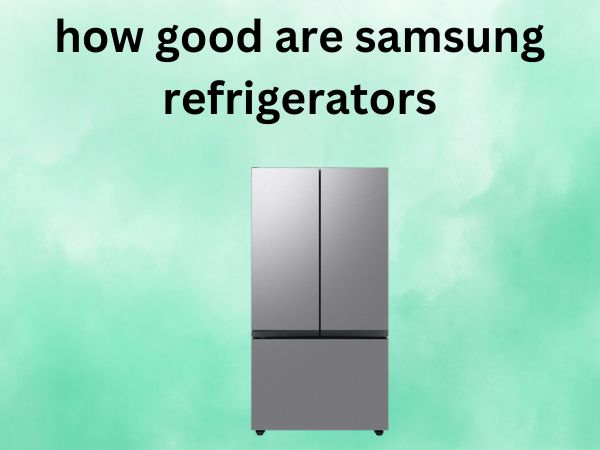How Good Are Samsung Refrigerators? [A Complete Analysis]
Have you ever stood in an appliance store, staring at the gleaming wall of refrigerators, wondering if that sleek Samsung model is really worth the investment? You’re not alone. With their eye-catching designs and feature-rich displays, Samsung refrigerators certainly make a strong first impression. But good looks don’t keep your milk cold or your vegetables fresh, do they?
In this comprehensive guide, I’ll cut through the marketing hype to give you the honest truth about Samsung refrigerators. Drawing from customer experiences, expert opinions, and performance data, we’ll explore whether these popular appliances truly deserve a place in your kitchen.
Table of Contents
Samsung’s Position in the Refrigerator Market
Samsung isn’t just another player in the refrigerator game—they’re one of the dominant forces reshaping how we think about food storage. Originally known for electronics, Samsung entered the appliance market with the same innovation-focused mindset that made their smartphones and TVs household names.
Today, Samsung holds approximately 19% of the global refrigerator market share, placing them among the top three manufacturers worldwide. Their rapid growth stems from a combination of cutting-edge features, modern aesthetics, and aggressive marketing strategies that position their refrigerators as lifestyle products rather than mere appliances.
What sets Samsung apart is their approach to refrigeration as an extension of their tech ecosystem. While traditional manufacturers focused on cooling efficiency and storage capacity, Samsung brought digital innovation to the kitchen with features that connect to your smartphone and integrate with your smart home.
Key Features of Samsung Refrigerators
Samsung refrigerators don’t just chill your food—they’ve reimagined what a refrigerator can do. Let’s break down some of the standout features that make these appliances unique:
Smart Technology Integration
The Family Hub, Samsung’s flagship smart refrigerator feature, transforms your fridge door into a command center for your kitchen and home. With built-in touchscreens ranging from 21 to 27 inches, these refrigerators let you:
- View inside your fridge remotely using internal cameras
- Create shopping lists that sync with your phone
- Order groceries directly from the refrigerator
- Display family calendars and leave digital notes
- Stream music and videos while you cook
- Control other smart home devices
Even their non-Family Hub models often include WiFi connectivity and smartphone app integration, allowing for remote temperature adjustments and maintenance alerts. This connectivity represents a fundamental shift in how we interact with our appliances—no longer just passive cooling boxes but active participants in our digital lives.
Innovative Storage Solutions
Samsung’s approach to interior design focuses on maximizing usable space while increasing organization flexibility:
- FlexZone compartments that can switch between freezer and refrigerator temperatures
- Adjustable shelving systems that accommodate items of various heights
- Twin Cooling Plus technology that maintains optimal humidity levels in different compartments
- Door-in-door designs that provide quick access to frequently used items
- Metal Cooling plates that help maintain consistent temperatures
The practical benefit? You can store more food in the same physical footprint while keeping it better organized and more accessible. For large families or enthusiastic entertainers, these design innovations can make a meaningful difference in daily use.
Energy Efficiency Ratings
In an era of rising energy costs and environmental awareness, Samsung has positioned itself as a leader in refrigeration efficiency. Most of their current models carry Energy Star certification, with many exceeding the minimum requirements by 10-20%.
Their Digital Inverter Compressors automatically adjust power usage based on cooling demand, operating across multiple levels rather than simply turning on and off. This technology not only reduces energy consumption but also decreases wear and tear on components, potentially extending the refrigerator’s lifespan.
A typical Samsung refrigerator uses between 400-700 kWh per year, which translates to approximately $48-84 in annual electricity costs. While the initial purchase price may be higher than some competitors, these efficiency gains can offset some of that premium over time.
Durability and Reliability Assessment
When investing in a major appliance like a refrigerator, longevity matters. After all, the best features in the world don’t mean much if your fridge breaks down after three years. So how do Samsung refrigerators fare in the reliability department?
The average lifespan of a modern refrigerator ranges from 10 to 15 years. Based on consumer reports and warranty claim data, Samsung refrigerators typically fall within this range, with most models lasting 11-13 years with proper maintenance. This places them roughly on par with other major brands like LG, Whirlpool, and GE.
However, the picture becomes more complex when we examine specific components and common issues.
Common Issues and Concerns
Even the most reliable appliance brands have their weak points, and Samsung is no exception. Based on customer feedback and service records, here are the most frequently reported issues with Samsung refrigerators:
- Ice maker problems: Perhaps the most common complaint relates to ice makers that stop working, make too little ice, or leak water. These issues appear more prevalent in French door models.
- Cooling inconsistencies: Some users report temperature fluctuations, particularly in the fresh food section, or frost buildup in the freezer compartment.
- Control board failures: The electronic control boards that manage smart features occasionally malfunction, requiring professional replacement.
- Compressor failures: While less common than the above issues, compressor problems are more serious when they occur, often requiring expensive repairs.
- Door seal deterioration: Some models experience premature wearing of door gaskets, reducing cooling efficiency.
It’s worth noting that Samsung has addressed many of these issues in newer models, with significant improvements in ice maker design and compressor reliability since 2019. Still, these remain points of concern for potential buyers.
Component Quality Analysis
Looking beyond common problems, let’s assess the quality of key components that determine a refrigerator’s performance and longevity:
- Compressors: Samsung’s Digital Inverter Compressors are generally well-regarded for efficiency and quietness. They come with a 10-year warranty, reflecting Samsung’s confidence in their durability.
- Insulation: Their refrigerators use high-density polyurethane foam insulation that maintains temperature efficiency throughout the appliance’s life.
- Interior materials: Most models feature tempered glass shelving and high-impact plastic bins that resist cracking and staining over time.
- Door hinges: The door mechanisms typically maintain alignment well, even with daily use, thanks to reinforced metal hinges.
- Electronic components: This is perhaps Samsung’s most vulnerable point. As refrigerators become more feature-rich, they include more complex circuit boards and sensors that can fail.
One significant advantage Samsung offers is parts availability. As a global manufacturer with extensive distribution networks, replacement parts remain readily available even for older models—something that can’t be said for all refrigerator brands.
Value for Money Analysis
Samsung refrigerators generally command premium prices compared to more basic brands. But does the additional cost translate to proportional value? Let’s break down the economics.
Price Range Comparison
Samsung refrigerators span a wide price spectrum:
- Entry-level models: $899-$1,299
- Mid-range models: $1,300-$2,500
- Premium/Smart models: $2,500-$4,500+
Compared to budget brands like Frigidaire or Amana, Samsung carries a 15-30% price premium. When matched against similar feature sets from brands like LG or Whirlpool, the price difference narrows to 5-15%.
The premium becomes more substantial when comparing Samsung’s high-end smart refrigerators with traditional models. A Family Hub refrigerator might cost $1,000+ more than a similar-sized conventional refrigerator from another reputable brand.
Long-term Cost Considerations
Initial purchase price only tells part of the story. When evaluating value, consider:
- Energy savings: The typical Samsung refrigerator might save $20-40 annually in electricity costs compared to less efficient models.
- Repair frequency: Based on consumer surveys, Samsung refrigerators require service calls slightly more frequently than industry leaders like Whirlpool and GE, but less often than budget brands.
- Repair costs: When problems do occur, Samsung repairs tend to be more expensive due to the complexity of components and higher parts costs. A typical service call ranges from $200-500, with major repairs like compressor replacement potentially exceeding $1,000.
- Feature utilization: The value of advanced features depends entirely on whether you’ll use them. The Family Hub’s capabilities might be worth the premium for tech-savvy households but represent wasted money for those who won’t use them.
- Resale value: Samsung refrigerators typically retain 40-50% of their value after five years—slightly better than industry averages due to their brand recognition and desirable aesthetics.
When factoring in all these considerations, Samsung refrigerators generally deliver fair value for their price point, though not necessarily exceptional value. The calculation swings more favorably for those who will actively use the smart features and appreciate the design elements.
Customer Satisfaction and Reviews
What do actual owners think about their Samsung refrigerators? Aggregating data from major retail platforms, consumer review sites, and appliance forums reveals some interesting patterns:
- Overall satisfaction scores average 4.1/5 stars across major platforms
- 67% of owners would recommend their Samsung refrigerator to others
- 78% express satisfaction with cooling performance and food preservation
- 85% appreciate the design and aesthetic appeal
- 63% feel they received good value for money
- 54% of Family Hub owners regularly use the smart features
The most frequently praised aspects include:
- Attractive, modern designs that enhance kitchen aesthetics
- Flexible storage configurations
- Effective food preservation, particularly for produce
- Quiet operation compared to older refrigerators
- Intuitive interface and controls
Common criticisms center around:
- Ice maker reliability
- Higher-than-expected repair frequency after 3-5 years
- Learning curve for utilizing advanced features
- Customer service experiences during warranty claims
Professional Review Consensus
Professional appliance reviewers tend to rate Samsung refrigerators favorably, with most models scoring between 7.5-8.5/10. They consistently praise Samsung’s innovation, design sensibility, and feature set while expressing some reservations about long-term reliability.
Consumer Reports typically places Samsung models in the middle to upper-middle of their rankings, with particularly strong scores for temperature performance, energy efficiency, and noise levels. However, they often note concerns about predicted reliability based on their member surveys.
The professional consensus seems to be that Samsung excels at creating feature-rich, well-designed refrigerators that perform their core functions effectively, but may require more maintenance than some competing brands as they age.
Samsung Refrigerator Models Worth Considering
With dozens of models available, finding the right Samsung refrigerator can be overwhelming. Here are some standout options worth considering:
Best Budget-Friendly Options
RT21M6213SR (Top Freezer, $999) This affordable 21 cubic foot model offers excellent energy efficiency and Samsung’s Twin Cooling Plus system without breaking the bank. It lacks smart features but delivers reliable cooling performance and attractive design at a reasonable price point.
RF220NCTASR (French Door, $1,299) For those wanting a French door configuration without the premium price tag, this 22 cubic foot model offers good value. It includes adjustable shelving, humidity-controlled crispers, and ice making capabilities in a fingerprint-resistant stainless steel finish.
Premium Feature-Rich Models
RF23A9771SR (Family Hub, $3,499) The flagship of Samsung’s refrigerator line, this 23 cubic foot counter-depth model includes the 27-inch Family Hub touchscreen, FlexZone drawer, dual ice makers, and premium finishes. It represents the cutting edge of refrigerator technology for those willing to invest.
RF28R7551DT (4-Door Flex, $2,899) This spacious 28 cubic foot model features the versatile FlexZone compartment that can switch between freezer and refrigerator temperatures, metal cooling plates for consistent temperatures, and an attractive fingerprint-resistant tuscan stainless steel finish.
Bespoke RF29BB8600 (French Door, $2,699) Part of Samsung’s customizable Bespoke line, this refrigerator offers interchangeable door panels in various colors and finishes. Beyond aesthetics, it includes a dual auto ice maker, adjustable shelving, and impressive capacity in a sleek package.
Each of these models caters to different needs and budgets while showcasing Samsung’s strengths in design, organization, and feature integration.
Frequently Asked Questions
How long do Samsung refrigerators typically last?
With proper maintenance, most Samsung refrigerators last between 11-13 years, which aligns with the industry average. Models with fewer electronic components tend to have longer lifespans than feature-rich smart refrigerators. Regular cleaning of condenser coils, prompt repair of minor issues, and proper installation can all help extend the useful life of your Samsung refrigerator.
Are Samsung refrigerator repairs expensive?
Samsung refrigerator repairs typically cost between $200-500 per service call, which is somewhat higher than industry averages. This is primarily due to the complexity of components and electronics in many models. Major repairs like compressor replacement can exceed $1,000. Many owners find value in extended warranty coverage, especially for models with advanced features like the Family Hub.
Do Samsung refrigerators have good warranties?
Samsung offers a standard 1-year parts and labor warranty on all refrigerators, with an additional 5-year warranty on sealed system components and a 10-year warranty on digital inverter compressors. This compressor warranty is particularly strong compared to industry standards. For comprehensive protection, Samsung offers optional Care+ extended warranty plans that can provide coverage for up to 5 additional years.
Which Samsung refrigerator model is most reliable?
Based on consumer reports and service data, Samsung’s traditional side-by-side and top-freezer models generally experience fewer repair issues than their French door counterparts. Specifically, the RS25J500DSR side-by-side and RT21M6213SR top-freezer models have solid reliability track records. Models with fewer smart features and simpler ice making systems tend to require fewer repairs over their lifespans.
Is the Samsung Family Hub feature worth the extra cost?
The value of the Family Hub depends entirely on your household’s tech adoption and kitchen habits. Families who frequently use digital calendars, shared shopping lists, and smart home controls find substantial value in having these features integrated into their refrigerator. However, households that won’t regularly use these capabilities might find better value in Samsung’s non-Family Hub models, which offer similar cooling performance at lower price points
Conclusion: Are Samsung Refrigerators Worth Buying?
After this comprehensive examination, we can now answer the central question: How good are Samsung refrigerators?
The answer, like most major purchases, depends on what you value most. Samsung refrigerators excel in design innovation, feature integration, and technology advancement. They offer good—though not exceptional—cooling performance and energy efficiency, coupled with attractive aesthetics that enhance modern kitchens.
For tech-savvy consumers who appreciate smart home integration and are willing to pay a premium for cutting-edge features, Samsung represents a compelling option. Their refrigerators can genuinely enhance your kitchen experience with thoughtful organization, flexible storage, and digital convenience.
However, if maximum reliability and longevity are your primary concerns, brands like Whirlpool and GE might deserve stronger consideration. While Samsung refrigerators aren’t unreliable, they do tend to require repairs somewhat more frequently than industry leaders, particularly as they age beyond the 5-year mark.
Ultimately, Samsung refrigerators deserve their popularity and market position. They bring genuine innovation to the category and offer solid performance wrapped in beautiful designs. Just be sure to purchase from an authorized dealer, register for the full warranty, and consider an extended service plan for higher-end models with complex electronics.
For most households, a carefully selected Samsung refrigerator will provide satisfying performance and useful features that justify the investment—just go in with realistic expectations about potential maintenance needs down the road.







